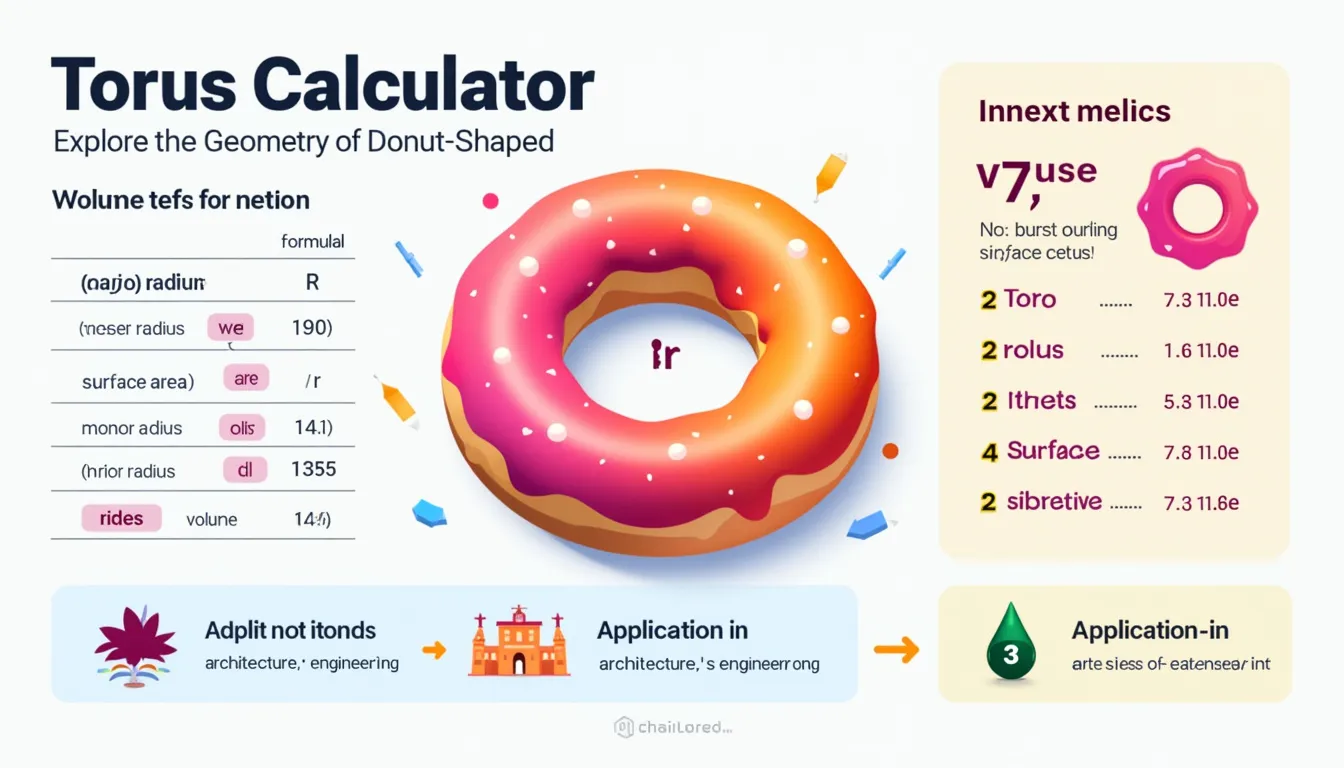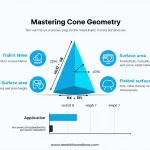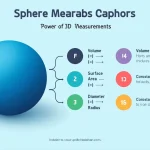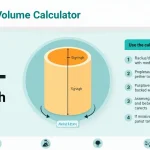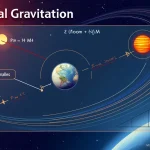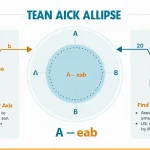Torus Calculator
Is this tool helpful?
Torus Calculator: Explore the Geometry of Donut-Shaped Objects
How to Use the Torus Calculator Effectively
Our Torus Calculator is a user-friendly tool designed to help you quickly and accurately calculate the volume and surface area of a torus. Follow these simple steps to make the most of this powerful geometric calculator:
- Enter the major radius (R) of the torus in the first input field. This is the distance from the center of the tube to the center of the torus.
- Input the minor radius (r) of the torus in the second field. This represents the radius of the tube itself.
- Click the “Calculate” button to generate the results.
- Review the calculated volume and surface area displayed in the results section.
Remember, the major radius (R) must be greater than the minor radius (r) for a valid torus shape. If you enter invalid values, the calculator will display an error message to guide you.
Understanding the Torus: Definition, Purpose, and Benefits
A torus is a three-dimensional geometric shape that resembles a donut or an inner tube. It’s formed by rotating a circle around an axis that lies in the same plane as the circle but does not intersect it. This unique shape is found in various natural and man-made objects, making it an essential subject in mathematics, engineering, and design.
The purpose of our Torus Calculator is to simplify the process of calculating the volume and surface area of this complex shape. By providing these crucial measurements, the calculator serves several important functions:
- Assists in architectural and engineering design processes
- Facilitates manufacturing and production planning for torus-shaped objects
- Supports educational endeavors in geometry and calculus
- Aids in scientific research involving toroidal structures
Understanding the properties of a torus is beneficial in numerous fields, including physics, astronomy, biology, and computer graphics. Our calculator makes these calculations accessible to professionals, students, and enthusiasts alike.
The Mathematics Behind the Torus Calculator
The Torus Calculator uses two fundamental formulas to compute the volume and surface area of a torus. Let’s explore these formulas and their components:
Volume of a Torus
The volume of a torus is calculated using the following formula:
$$V = (π r^2) (2πR)$$Where:
- V is the volume
- r is the minor radius (radius of the tube)
- R is the major radius (distance from the center of the tube to the center of the torus)
- π (pi) is approximately 3.14159
Surface Area of a Torus
The surface area of a torus is determined by this formula:
$$A = (2πR) (2πr)$$Where:
- A is the surface area
- R is the major radius
- r is the minor radius
- π (pi) is approximately 3.14159
These formulas allow for precise calculations of a torus’s properties, which are essential in various applications.
Benefits of Using the Torus Calculator
Our Torus Calculator offers numerous advantages for anyone working with or studying toroidal shapes:
- Time-saving: Perform complex calculations instantly, eliminating the need for manual computations.
- Accuracy: Minimize human error and ensure precise results for your projects or studies.
- Accessibility: Use the calculator anytime, anywhere, with just an internet connection.
- User-friendly interface: Easy-to-use design makes it accessible for both experts and beginners.
- Educational tool: Helps students visualize and understand the properties of a torus.
- Professional resource: Supports engineers, architects, and designers in their work with toroidal structures.
- Versatility: Applicable to various fields, from manufacturing to theoretical physics.
Addressing User Needs and Solving Specific Problems
The Torus Calculator addresses several key user needs and solves specific problems related to toroidal geometry:
1. Simplifying Complex Calculations
Calculating the volume and surface area of a torus manually can be time-consuming and prone to errors. Our calculator eliminates these issues by providing instant, accurate results. This is particularly useful for:
- Students working on geometry assignments
- Engineers designing toroidal components
- Researchers analyzing toroidal structures in nature or technology
2. Facilitating Design and Manufacturing Processes
In industries where toroidal shapes are common, such as automotive or aerospace engineering, precise measurements are crucial. The Torus Calculator helps:
- Determine material requirements for manufacturing
- Calculate storage or shipping space needed for toroidal products
- Optimize designs for efficiency and cost-effectiveness
3. Supporting Educational Objectives
For educators and students, the Torus Calculator serves as an invaluable learning tool by:
- Illustrating the relationship between a torus’s dimensions and its properties
- Providing a platform for exploring geometric concepts
- Offering a way to verify manual calculations and understand potential errors
4. Enhancing Scientific Research
In fields like physics and astronomy, toroidal shapes play significant roles. The calculator aids researchers by:
- Quickly providing data for theoretical models
- Assisting in the analysis of natural toroidal phenomena
- Supporting calculations in plasma physics and fusion research
Practical Applications and Use Cases
The Torus Calculator finds applications in various fields. Here are some practical examples and use cases:
1. Architectural Design
Architects often incorporate toroidal elements in their designs for both aesthetic and functional purposes. The calculator can help:
- Determine the surface area of a donut-shaped roof for material estimation
- Calculate the volume of a toroidal atrium for climate control planning
- Design toroidal water features with precise dimensions
2. Engineering and Manufacturing
In engineering, toroidal shapes are found in various components and structures:
- Calculating the volume of toroidal fuel tanks in aerospace engineering
- Determining the surface area of toroidal seals or gaskets in mechanical engineering
- Designing toroidal transformers in electrical engineering
3. Scientific Research
Toroidal shapes are significant in various scientific fields:
- Analyzing the properties of tokamak fusion reactors in plasma physics
- Studying the structure of certain proteins in molecular biology
- Investigating toroidal vortices in fluid dynamics
4. Education
The calculator serves as an educational tool in various scenarios:
- Teaching students about 3D geometry and calculus
- Demonstrating the relationship between dimensions and geometric properties
- Providing a practical application for mathematical concepts
5. Art and Design
Artists and designers may use the calculator for:
- Creating toroidal sculptures with specific dimensions
- Designing jewelry with donut-shaped elements
- Planning installations that incorporate toroidal forms
Frequently Asked Questions (FAQ)
1. What is a torus?
A torus is a three-dimensional geometric shape that resembles a donut or an inner tube. It’s formed by rotating a circle around an axis that lies in the same plane as the circle but does not intersect it.
2. What are the major and minor radii of a torus?
The major radius (R) is the distance from the center of the tube to the center of the torus. The minor radius (r) is the radius of the tube itself.
3. Why must the major radius be greater than the minor radius?
If the major radius were smaller than or equal to the minor radius, the resulting shape would not be a proper torus. It would either be a sphere (if equal) or an invalid shape (if smaller).
4. Can this calculator be used for other donut-shaped objects?
Yes, this calculator can be used for any object that has a perfect toroidal shape, regardless of its size or material.
5. How accurate are the results from this calculator?
The calculator uses precise mathematical formulas and should provide highly accurate results. However, the accuracy of the output depends on the accuracy of the input measurements.
6. Can I use this calculator for partial tori?
This calculator is designed for complete tori. For partial tori, you would need to calculate the full torus and then determine the fraction you need based on the portion of the torus you’re working with.
7. Are there any real-world applications for tori?
Yes, tori have many applications in various fields, including architecture, engineering, physics, and biology. They are used in the design of certain buildings, in the shape of some mechanical parts, in the study of fusion reactors, and even in the structure of some biological molecules.
Please note that while we strive for accuracy and reliability, we cannot guarantee that the results from our webtool are always correct, complete, or reliable. Our content and tools might have mistakes, biases, or inconsistencies. Always verify important calculations with other sources or experts in the field.
Conclusion: Harnessing the Power of Toroidal Geometry
The Torus Calculator is a powerful tool that simplifies complex geometric calculations, making it an invaluable resource for professionals, students, and enthusiasts alike. By providing quick and accurate calculations of a torus’s volume and surface area, it supports a wide range of applications across various fields.
Key benefits of using our Torus Calculator include:
- Time-saving and error-reducing capabilities
- Accessibility and ease of use
- Versatility across multiple disciplines
- Support for educational and professional endeavors
Whether you’re an architect designing an innovative structure, an engineer working on toroidal components, a scientist exploring natural phenomena, or a student delving into the fascinating world of 3D geometry, our Torus Calculator is here to assist you.
We encourage you to explore the capabilities of this tool and discover how it can enhance your work or studies. Remember, understanding and utilizing toroidal geometry can open up new possibilities in design, engineering, and scientific research.
Start using our Torus Calculator today and unlock the potential of toroidal shapes in your projects and studies. Embrace the elegance and utility of this unique geometric form, and let our calculator be your guide in navigating the world of tori.
Important Disclaimer
The calculations, results, and content provided by our tools are not guaranteed to be accurate, complete, or reliable. Users are responsible for verifying and interpreting the results. Our content and tools may contain errors, biases, or inconsistencies. We reserve the right to save inputs and outputs from our tools for the purposes of error debugging, bias identification, and performance improvement. External companies providing AI models used in our tools may also save and process data in accordance with their own policies. By using our tools, you consent to this data collection and processing. We reserve the right to limit the usage of our tools based on current usability factors. By using our tools, you acknowledge that you have read, understood, and agreed to this disclaimer. You accept the inherent risks and limitations associated with the use of our tools and services.
